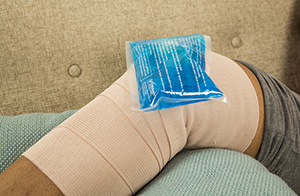Tips After Knee Surgery
August 1, 2023Home recovery
-
Put a bag of ice or an ice pack on your knee. Wrap the ice in a thin towel or place it on top of the bandage to protect your skin. Or your healthcare provider may recommend using a cold therapy device. Raise your knee above heart level.
-
Your healthcare provider may tell you not to put weight on your knee. Use a cane, crutches, or walker as directed.
-
Your healthcare provider may also give you pain medicines, anti-inflammatory pills, or both.
-
To prevent infection, keep your incisions dry. Use a plastic bag when icing your knee or taking a shower. Follow your healthcare provider's instruction on how long to wait before showering or bathing.
Strengthening your knee
You may be told to do exercises. You may need to use weights or resistance bands. To help make your knee stronger and prevent injuries, follow these tips:
-
Start out slowly. Then add repetitions or duration as advised.
-
Take short, frequent walks each day. Ask your healthcare provider when you can start, how long your walks should be, and how often you should take them.
-
Go to physical therapy, if advised. It can help you make your knee stronger. It can also improve your knee's range of motion.
-
Increase any exercise you do as approved by your healthcare provider or physical therapist.
At home, you play a major role in your recovery. The better you care for your knee, the faster you may heal. And the faster you heal, the sooner you can get back to your normal activities. Follow your healthcare provider’s instructions about how to care for your knee after surgery.
Take note
Talk with your healthcare provider about what exercise program is best for you. Always tell your healthcare provider if an exercise causes new or lasting pain.






